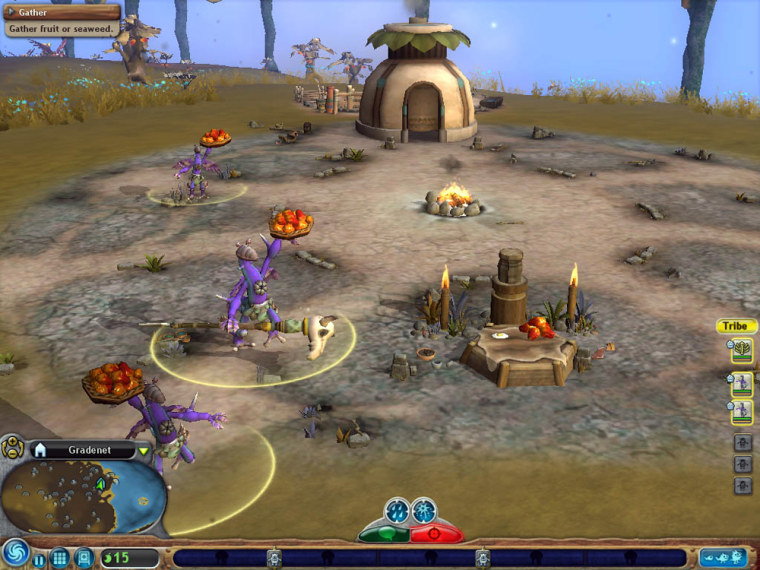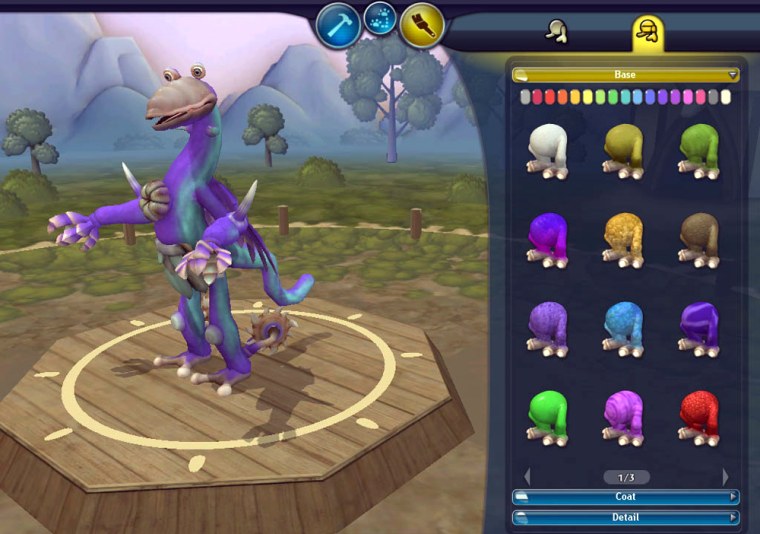Few games charm as quickly as "Spore." Seconds into the game, you slip into the primordial ooze with your single-cell organism. The creature blinks at you with a now-what helplessness that fosters the kind of emotional attachment that so many epic adventure games loaded with 40-hour story arcs and blockbuster cinematics can only hope for.
It's like you've been handed a baby. You want so much for it to grow up and make something of itself. You know, like a four-legged bird with a spiky tail. Or a blobby serpent with 18 eyes going down its spine.
"Spore" celebrates the artistry of evolution. Shepherded by Will Wright, the genius behind the mega-selling "Sims" series, "Spore" starts several zillion generations back from his famous virtual humans. You guide a creature from the first moment of life through its rise as the dominant species of its home planet, eventually sending your creations into the cosmos to colonize the galaxy.
To say the scale of "Spore" is epic is to insult the definition of the word. This is a massive game that requires thousands of decisions to get from a speck in a muddy tide pool to galactic conqueror.
The game is divided into five chapters. Each represents a step on the evolutionary ladder. The initial stage occurs under the microscope, seconds after a comet seeds your planet with the building blocks for life.
Important first decision
Here, you are offered your first important decision: Is your little spore an herbivore or meat-eater? You are choosing between hunter and forager, and the effects of this decision are long-reaching. A live-and-let-live choice at the cellular level can lead to a tribe of creatures that seek power through friendship rather than violence.
As you swim through the soup, you collect DNA by feeding on plant life or carving into other cells. Upon reaching certain thresholds, you evolve.
In the evolution screen, you add unlocked extras to your spore, such as spikes or flagellum in hopes of beating the odds in your first round of "survival of the fittest" against other organisms.
The cellular segment plays like a casual game, with the player just clicking around the screen to direct their spore. This is no accident. By offering a simple opening scene and a taste of creature customization, Maxis hopes to get its hooks into the Yahoo! Games crowd.
Soon, you grow legs and enter the second stage of the game. Now on dry land, you work in a pack to befriend rival creatures or drive them to extinction.
Defeating other packs or scavenging skeletons grants additional body parts for your evolutionary growth cycles. Now you can start adding arms, wings, beaks, and other appendages that help you defend yourself or attract other animals.
Charming creatures with a wiggle of your tail is often just as effective at guaranteeing survival as baring your teeth and going for the kill.
Third stage: Tribal life
The third stage drops you into tribal life, with your creatures now smart enough to use tools and build rudimentary houses.
You compete with rival tribes for domination by either dazzling them with social skills or burning their tiny villages into the ground. You use the mouse to lasso groups of your creatures and assign them tasks like foraging for food and attacking enemies.
The controls and pacing are easy enough for casual players to get into it without realizing they are actually playing a simplified real-time strategy game like "Command & Conquer."
Once you establish your top tribe, you launch into the civilization sequence. Here, you master commerce and construction, building vehicles and entire cities. You must balance industry and personal happiness. For example, building a factory raises your income, but your creatures get tired and need some form of social release — so it's a good idea to invest in something like a theater.

The goal is to grow and eventually spread your culture around the home world. Diplomacy gets you pretty far, but sometimes violence is unavoidable. This stage plays out like a streamlined "Sid Meier's Civilization," but with more customization tools for the player.
Finally, you take off into the stars to enter the cosmic race. As you spread across the universe, you discover planets with ongoing civilizations and barren worlds. Entire planets can be made over to support life. You get into tussles with other space-faring empires as you colonize the galaxy. The space part of the game is huge (sort of like space) and much more complex than the previous four stages put together.
Even though it is satisfying to see the arc of going from cells to the stars, ultra-casual gamers may finally become overwhelmed at this point. However, they can just start over at the individual planets and scale down to the cellular level again, making different decisions to see what crawls out of the ocean this time.
Maxis wisely made sure each stage leading up to space only takes a little over an hour to complete (depending on how much gawking you do), so you can make progress without a significant time sink.
No dead ends
Up until the space stage, what makes "Spore" such a success is that none of the choices are overwhelming and the game offers no dead ends. Experimenting with different creature shapes and sizes is easy and intuitive. You can trade parts in and out with no penalty, encouraging players to be imaginative. In fact, the creature and vehicle creation tools are so engaging, you may spend more time tinkering with color choices and limb placement than you do in the wild world.
And if your spore ever meets an untimely demise, a new one is hatched right away with the exact same skills. Nothing is lost. At no point does this game ever make you feel like you made a mistake.
Maxis spent a lot of time on the creation tools not just so you can marvel at your own googly-eyed monsters, but because they want you to also share these creations with the world. "Spore" is built as a massive spider web to catch all sorts of user-generated content, from creatures to vehicles, and easily share it with other players.
When you get online and interact with other civilizations, you just click on things that catch your fancy and they are instantly added to an in-game catalog called the Sporepedia. Now you can build these creations in your own game. There is some wildly inventive stuff out there, and as the "Spore" community grows worldwide, expect to see the kind of democratic creativity that made YouTube such a phenomenon.
Creating a game that any gamer of any skill level will enjoy is something of a Holy Grail — and it's one that Maxis has accomplished with "Spore." Hardcore gamers will love the space stage and the explosion of content. Casual gamers will enjoy the easy point-and-click creation tools and the non-threatening game play of the cellular and simple creature stages.
Best of all, neither gamer needs a brand-new machine to play "Spore," as Maxis is very forgiving with system requirements. Even if your computer is three years old (which is, what, 1,000 in computer years?), you can still try your hands at your very own Genesis.
